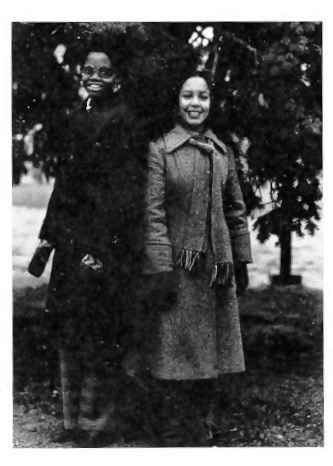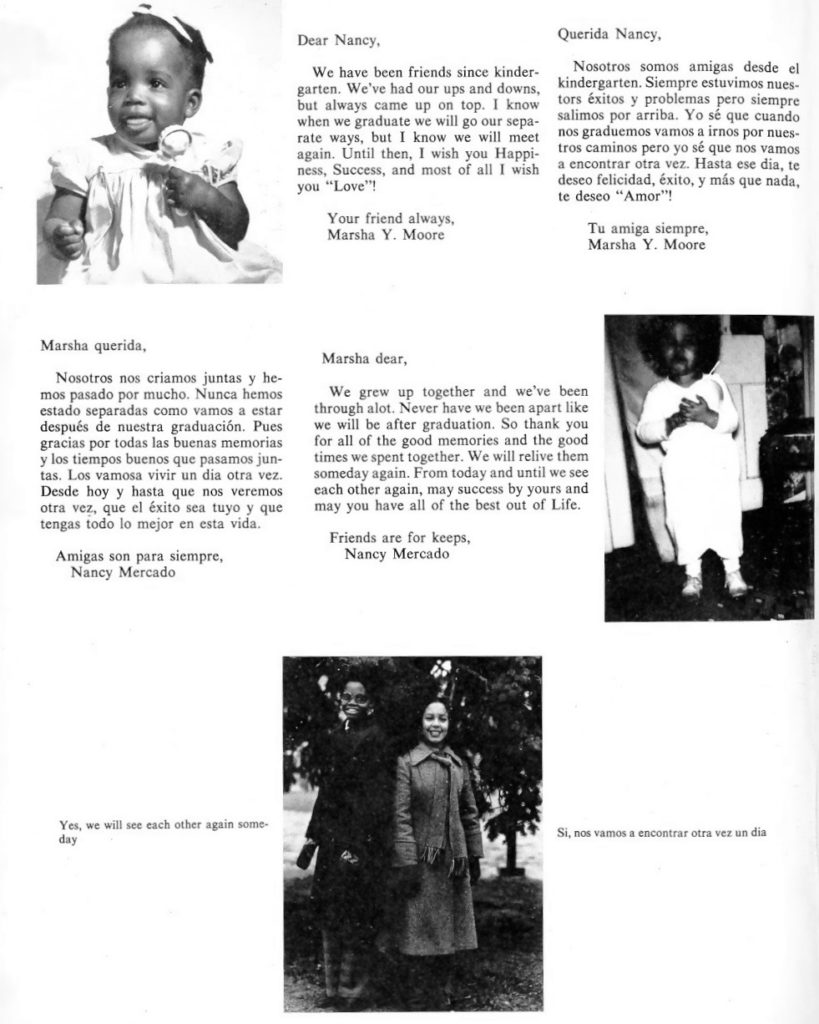Old age isn’t so bad when you consider the alternative.
~Maurice Chevalier
I lost my best friend when we were 32. We met when 5, in kindergarten. Marsha Moore was a wonderfully tall fat Black girl who treated me like her sister. We were sisters. Marsha didn’t get the chance to grow old. Her life in this world was excised in midflight. I’ll never forget the rapid sequence of events winding up to her metamorphosis. It was one of several nightmares I’ve lived.
I was excited about my long weekend, about seeing Marsha and spending time near the ocean, about eating those fabulous White House Subs I grew up on. Returning home in the spring, spun anticipation of relaxed salty humid air that healed. Riotous Jitney rides up and down Pacific Ave. Walks on a vacant Boardwalk with only seagulls to converse with. Visiting the Atlantic Ocean that roared her absolute reign over us all, she fixed all things into perspective, especially on fog-filled damp days. And so, it was. I hopped on a bus for the 2 ½ hour ride that would reunite my memory and me. I couldn’t wait.
Marsha was there to greet me and how happy we were to see each other after such a while.
It was all the experiences I knew it would be, my trip home, my trip back to see my sister, except for the morning of my departure. Ready to have her drive me to the bus station, I sat in her La-Z-Boy recliner waiting. I watched Good Morning America on her bedroom television as she moved back and forth around me, putting herself together. Then, just before we were to set out, Marsha plopped down on her bed facing the ceiling. She seemed tired; maybe had the sniffles? For a second, I thought about it as I watched her, for a second. But up she flew again ready to exit and as fast as she rose, so rose and dissolved into the air my puzzlement about what had just occurred. I forgot about it. At the bus station, we said our so-longs and I promised to return sooner than I’d done on this occasion.
One week passed and I received a call. Marsha was hospitalized. I would return much sooner than promised and for all the wrong reasons.
As I entered the hospital room, there she laid attached to all manner of modern machinery and tubular gear sounding off. She could not speak, and I could not either. It was a slow descent toward her bed, my mouth ajar. I was afraid. Her mother asked me to touch her hand and I did.
“Hey Marsha, it’s Nancy. She came to see you.”
A tear spilled down her dark plump cheek and I let go moving rapidly into the corridor where I became unglued. The scene of Marsha plopping down on her bed quickly rushed me. I should have realized back then she was ill.
Three weeks past and I received a call. Marsha died. I returned as promised to see my sister in this world, for the last time. Her funeral was a Baptist bash. Preacher preaching. Choir singing and dancing. She laid in a white coffin. She, dressed in white. I saw her from afar. Not how I wanted to remember my dear friend, so I never approached her casket.
We filed out and into cars; her high school classmates, to begin the funeral procession. We passed our neighborhoods; the places we walked together, the places we played together as children. We passed the schools we attended together, passed the place where Marsha worked. And from that tall building’s windows above, saw the hands of her coworker’s waving white handkerchiefs. It seemed like hundreds of them. As we rode by, it seemed like flocks of seagulls flying overhead.
Later we gathered to reminisced at a classmate’s home, when as if signaling before her final departure, a giant rainbow appeared across the way. We ran to the open door, some screaming into the street…
“Look! It’s Marsha! She’s telling us she’s ok!”
I took the bus back that night and not having any more promises to keep, did not return home for 23 years.
…
When I turned 50 I promised myself I would celebrate in a big way. I sat through the magnificent Cirque du Soleil; that exquisitely colorfully choreographed spectacle featuring the finest acrobats (with special effects throughout the theater) and sobbed quietly during the entire program. Knowing I passed thru a doorway of years that could never be retraced in this lifetime, I wept bitterly for the death of my youth. And so, I roamed the City with a shame-ridden impatience that stuck to me for some time. Like many, I’d been duped. Taken in by America’s fast-dispensable corporate star-struck culture that swallows us into its whirlpool, that convinces us we are what we are not, that takes us for that wild ride until we wake the moment our stark lives crash against reality. I battled to accept the changes that were happening to my face, to my body. I fought to deprogram myself from society’s indoctrination drilled in for years (on television, in print media, on the internet and all up and down city streets on hundreds of billboards) …
“Only the young are beautiful!”
“Youth knows best!”
“To be young is to be a ‘star!’”
The American “ideal” dictated, I was no longer part of that exclusive youth club; no longer a younger writer surrounded by poets and artists twice my age, whose company and knowledge I sought. That time and those teachers were gone. As fast as if I’d just awaken to find myself in today I was now the older one; a phase in my life I once looked forward to sharing with my best friend Marsha. Now it was only an inconsequential, defunct phase not only in American society but, a defunct phase of my life. Unlike in many other cultures, being older or just old in the U.S. is not venerated, not a position of honor, or strength or wisdom or beauty but simply a sad state to be in; a societal inconvenience, a forgettable period. A reality that made each day of my life callous. All I could hear in my mind was America shouting…“You’re not beautiful any longer! Your opinions don’t matter anymore! You’re not important!” At this point, things got tougher. As if my attempts at breaking free from this brainwashing, especially at this stage of life, were not enough, now I was faced with several younger writers who’d also been programmed into believing such fantasies. And, some of who had no desire to associate with an older writer; not thin enough, not beautiful enough and certainly no star. America’s high-speed corporate consumerist monsoon would inundate even our poetic lives. The commercialization of poetry coupled with the advent of social media made for a maniacal frenzy of narcissism. Poetry became more like music videos and many “poets” craved the stage, not the page. The shame-ridden impatience that straddled my neck aided by this new “poetry” scene (more show business than poetry), my mounting age and weight; all ballooned into a runaway nightmare. I became split in two; running to catch the apparition that was my youth simultaneously piling up birthdays that brought on new weight, new sags, new aches and pains and mounting doubts. I receded into a blank netherworld until that day Marsha returned.
She presented herself in all her healed brilliant ebony exquisiteness to counsel me from Heaven. She shared the blessings of a long earthly life, revealed the beauty that is a warned body and polished soul. Marsha revealed the worth and honor growing old really is. She cleared away the shame, impatience and unhappiness that clung to me over the indifference I experienced from younger “poets,” over my aging that (as Marsha taught) was, in fact, an heirloom to revere. She restored my gaze toward the essence of true poetry and toward the eternity I once knew poetry to be.
*******************************************************************************************************************************************
Nancy Mercado is a recipient of the American Book Award for Lifetime Achievement which is awarded by the Before Columbus Foundation.
She is the editor of the Nuyorican Women Writers Anthology published in Voices e/Magazine, the Center for Puerto Rican Studies, Hunter College- CUNY; an online literary journal. A guest curator for the Museum of American Poetics, she is also the assistant editor for Eco-poetry.org; a website dedicated to addressing the issue of climate crises.
Featured on National Public Radio’s The Talk of the Nation, and a PBS NewsHour Special, America Remembers 9/11, Nancy has authored: It Concerns the Madness (a poetry collection), Las Tres Hermanas (a children’s coloring book), and is the editor of if the world were mine (a children’s anthology). Nancy also authored 7 theater plays which have all been produced. In 2015, she traveled to Havana, Cuba by invitation, to present her work at Casa de las Americas.
Nancy Mercado continues to present her work throughout the U.S. and abroad. For more information: www.nancy-mercado.com
 Wendy Angulo Productions
Wendy Angulo Productions









